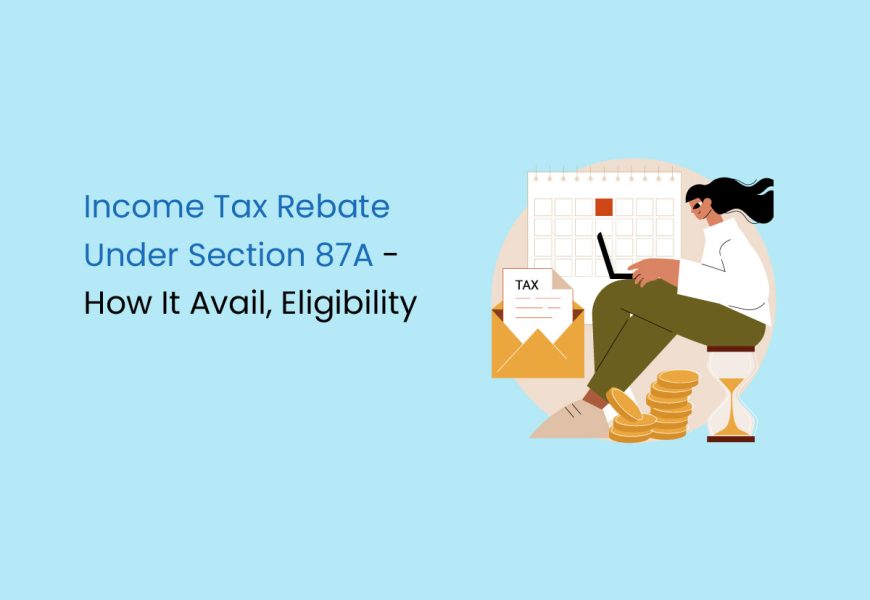The Indian government instituted a significant fiscal year 2013-14 initiative, unveiling a tax rebate under Section 87A. This thoughtful provision was designed to alleviate the income tax burden on eligible taxpayers, serving as both an incentive and relief measure.
Under Section 87A, taxpayers are entitled to a rebate of up to Rs. 12,500, effectively reducing their income tax liability. This rebate is applicable to individuals whose taxable income does not exceed Rs. 5,00,000, as observed in the financial year 2022-23.
For the financial year 2023-24 (assessment year 2024-25), an extension of the tax rebate under Section 87A has been introduced, now encompassing an income of up to Rs. 7,00,000 in the new tax regime.
This tax rebate proves to be a valuable instrument for taxpayers, as it nullifies income tax liability for those whose total income, post Chapter VIA deductions, remains within the Rs. 5,00,000 threshold.
Read on to get around the nuances of Section 87A and discover who can avail themselves of this income tax rebate for the financial years 2023-24 and 2022-23.
What is Section 87A?
Section 87A of the Income Tax Act of 1961 plays a pivotal role in providing relief to resident individuals with taxable income within specified limits. For the fiscal year 2023-24 (assessment year 2024-25), noteworthy changes have been introduced under the new tax regime.
Under the latest provisions, the rebate limit has been increased to Rs. 7,00,000, catering to resident individuals with taxable income within this expanded threshold. This means that individuals falling within this income bracket can now avail of a rebate of Rs. 25,000 or the actual amount of tax payable, whichever is lower.
In contrast, for those adhering to the old tax regime, the rebate limit continues to stand at Rs. 5,00,000, with the corresponding rebate amount remaining at Rs. 12,500. These provisions not only offer financial respite but also emphasise the government’s commitment to making taxation more inclusive and beneficial for taxpayers. Stay informed about these amendments to ensure you maximise the available rebates based on your tax regime.
Rebate Under Section 87A
In the fiscal year 2023-24, individuals with a total taxable income of up to Rs. 7 lakh can benefit from a valuable tax rebate under Section 87A of the Income Tax Act. This provision offers a tax break equivalent to Rs. 25,000 or the applicable tax, whichever amount is lower.
This marks a continuation of the favourable tax treatment that individuals enjoyed under the previous tax structure, where the rebate stood at Rs. 12,500. The enhancement in the rebate under Section 87A aligns with the government’s efforts to provide relief to taxpayers within a specified income bracket.
This tax rebate serves as an incentive for individuals with moderate incomes and plays a crucial role in fostering a more equitable taxation system. As taxpayers navigate the complexities of the income tax landscape, being cognizant of such provisions becomes instrumental in optimising one’s financial strategy.
Example of Rebate Under Section 87A
| Income Source | Amount under Old Tax Regime | Amount under the New Tax Regime |
|---|---|---|
| Gross Total Income | Rs. 7 lakhs | Rs. 7.5 lakhs |
| (-) Standard Deductions | Rs. 50,000 | Rs. 50,000 |
| (-) Section 80C Deductions | Rs. 1.5 lakhs | — |
| Total Taxable Income | Rs. 5 lakhs | Rs. 7 lakhs |
| Income Tax Payable | Rs. 12,500 | Rs. 25,000 |
| (-) Section 87A Rebate | Rs. 12,500 | Rs. 25,000 |
| Tax Payable | NIL | NIL |
Illustrating the impact of Section 87A Rebate for the financial year 2023-24, consider the following scenario. For an individual with a Gross Total Income of Rs. 7 lakhs under the old tax regime and Rs. 7.5 lakhs under the new tax regime, deductions such as Standard Deductions (Rs. 50,000) and Section 80C Deductions (Rs. 1.5 lakhs) are factored in to arrive at the Total Taxable Income.
In the old tax regime, the income tax payable amounted to Rs. 12,500. However, the Section 87A Rebate, which is also Rs. 12,500, reduces the tax liability to NIL, resulting in no tax payable. Similarly, under the new tax regime, despite an increased Income Tax Payable of Rs. 25,000, the Section 87A Rebate of Rs. 25,000 brings the tax liability down to NIL.
How to Avail of Tax Rebate Under Section 87A
To avail of the tax rebate under Section 87A during the filing of your Income Tax Return (ITR) for the financial year 2023-2024, adhere to the following steps:
- Step 1: Identify and calculate your Gross Total Income for the relevant financial year.
- Step 2: Subtract any eligible tax deductions, such as those related to life insurance policies, investments, and other tax-saving instruments, from your Gross Total Income.
- Step 3: Compute your total income after deducting the permissible tax deductions available under the Income Tax Act of 1961.
- Step 4: While filing your Income Tax Return (ITR), accurately declare your Gross Income and the tax deductions you have availed.
- Step 5: After successfully filing your ITR, proceed to claim the tax rebate under Section 87A.
Note: The maximum tax rebate available under Section 87A in the old tax regime for the financial year 2023-24 (Assessment Year 2024-25) is capped at Rs. 12,500.
Points to Remember
To further optimise your tax liability, consider claiming deductions under various sections such as:
- Section 80C for investments like ULIPs.
- Section 80D for medical insurance.
- Section 80CCD for National Pension System (NPS) contributions.
- Section 80G for donations, which can help reduce your total taxable income.
Eligibility For Tax Rebate Under Section 87A
To be eligible for claiming a tax rebate under Section 87A of the Income Tax Act for the financial year 2023-24 (Assessment Year 2024-25), individuals must satisfy the following eligibility criteria:
- The taxpayer must be an individual who is a resident of India. Non-residents are not eligible for this rebate.
- After considering deductions under Chapter VI-A (such as Section 80C, 80D, etc.), the total income of the individual should not exceed Rs. 5 lakh.
- The tax rebate is capped at Rs. 12,500. If the total tax payable by the individual is less than Rs. 12,500, the rebate will be equal to the total tax payable.
- Senior citizens falling within the age bracket of 60 to 80 years are eligible to claim the rebate. This includes individuals aged 60 years or above but less than 80 years.
- Super senior citizens aged 80 years and above are not eligible to claim the rebate under Section 87A.
Individuals must ensure they fulfil these specific conditions to qualify for the tax rebate. Adhering to these eligibility criteria is essential during the income tax filing to benefit from the rebate and optimise the overall tax liability. Always stay updated with any changes or amendments to tax regulations to ensure accurate compliance.
Tax Rebate u/s 87A for FY 2023-24 (AY 2024-25)
Some examples of the income tax rebate allowed under Section 87A for Financial Year 2023-2024 and Assessment Year 2024-25 are as follows:
| Total Annual Income (Rs.) | Tax Payable before Cess | Rebate Under Section 87A | Tax Payable + 4% Cess |
|---|---|---|---|
| Rs. 2.65 lakhs | Rs. 750 | Rs. 750 | 0 |
| Rs. 2.7 lakhs | Rs. 1,000 | Rs. 1,000 | 0 |
| Rs. 3 lakhs | Rs. 2,500 | Rs. 2,500 | 0 |
| Rs. 3.5 lakhs | Rs. 5,000 | Rs. 2,500 | Rs. 2,500 + Cess |
Example
For the Financial Year 2023-24 (Assessment Year 2024-25), let’s understand the tax liability of Mr Mohan, a 61-year-old retired person with a monthly pension of Rs 5,000 and Long Term Capital Gains (LTCG) from equity-oriented funds is Rs 4,70,000.
Total Pension Income: Rs. 5,000 x 12 = Rs. 60,000
LTCG on Equity-oriented Funds: Rs. 4,70,000
Since Mr Mohan is above 60 years but below 80 years, his basic exemption limit is Rs 3 lakh. The basic exemption limit should first be adjusted against normal income other than LTCG on equity-oriented funds.
After adjusting the basic exemption limit with the pension income (Rs. 3 lakh – Rs. 60,000), we are left with a balance of Rs. 2.4 lakh. This balance will then be adjusted against the LTCG on equity-oriented funds, leaving us with a balance LTCG of Rs. 2.3 lakh (Rs. 4.7 lakh – Rs. 2.4 lakh).
LTCG on equity-oriented funds is taxable at 10% on the amount exceeding Rs 1 lakh. Therefore, the tax will be levied on Rs. 1.3 lakh (Rs. 2.3 lakh – Rs. 1 lakh) at 10%, resulting in a tax liability of Rs. 13,000.
Note: The rebate under Section 87A is not applicable against tax on LTCG of equity-oriented funds (Section 112A). Therefore, Mr Mohan’s final tax liability would be Rs. 13,000 plus health & education cess at 4%, which amounts to Rs. 13,520.
Previous Years Tax Rebate u/s 87A
The table above outlines the amendments to Section 87A rebate limits on total taxable income for various financial years, providing insights into the evolving landscape of tax benefits for eligible individuals.
| Financial Year | Limit on Total Taxable Income | Amount of Rebate Allowed u/s 87A |
|---|---|---|
| 2021-22 | Rs. 5,00,000 | Rs. 12,500 |
| 2020-21 | Rs. 5,00,000 | Rs. 12,500 |
| 2019-20 | Rs. 5,00,000 | Rs. 12,500 |
| 2018-19 | Rs. 3,50,000 | Rs. 2,500 |
| 2017-18 | Rs. 3,50,000 | Rs. 2,500 |
| 2016-17 | Rs. 5,00,000 | Rs. 5,000 |
| 2015-16 | Rs. 5,00,000 | Rs. 2,000 |
| 2014-15 | Rs. 5,00,000 | Rs. 2,000 |
| 2013-14 | Rs. 5,00,000 | Rs. 2,000 |
FAQs on Section 87A
Can the 87A rebate be claimed on agricultural income?
Yes, resident individuals with agricultural income are eligible to claim the tax rebate under Section 87A
What is the income tax rebate under Section 87A AY 2023-24?
For AY 2023-24, the income tax rebate under Section 87A is Rs. 12,500 for resident individuals with taxable income up to Rs. 5,00,000.
What is the 87A limit 2023?
The Section 87A rebate limit for AY 2023-24 is Rs. 5,00,000 under the old tax regime and Rs. 7,00,000 under the new tax regime, making individuals eligible for the rebate if their taxable income is within the specified limit.
Are NRIs also eligible to claim a rebate under Section 87A?
No, non-resident Indians (NRIs) are not eligible to claim a rebate under Section 87A, as only taxpayers qualified as residents are permitted.
How can I calculate the rebate under 87A?
To calculate the rebate under Section 87A, determine your gross income and subtract available deductions under Sections 80C to 80U. If your net taxable income is less than Rs. 5 lakhs, you are eligible for a rebate of up to Rs 12,500 on the tax payable before health and education Cess.
Can one claim a rebate under Section 87A after they have paid their taxes for a FY?
Yes, you can claim a rebate under Section 87A while filing your tax return, even if you have already paid the taxes.





















